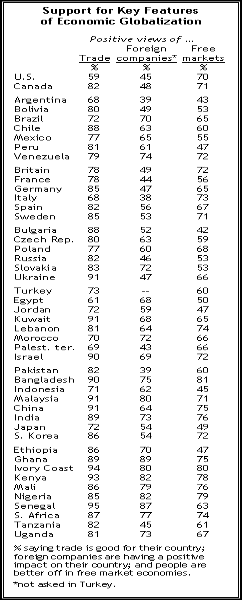 Here is some good news for those of you who worry that world public opinion is going the way of Naomi Klein (and the opposite for Klein's followers): It simply ain't so. The International Herald Tribune mentioned this recent survey done by the Pew Global Attitudes Project, and I am honestly amazed at the generally positive views individuals the world over hold about trade, multinational companies, and free markets. Which, of course, does not jibe with the anti-globalization rhetoric that free trade is the work of Beelzebub, multinational corporations are the tools of capitalist roaders, and so forth. Get this: According to the survey, 79% of those in Hugo Chavez's Venezuela have favorable views of trade, 74% of foreign companies, and 72% of free markets. Mind you, I myself am a bit in disbelief about the clearly positive views held in so many countries at this point in time. If you've studied survey or questionnaire design, the wording of the questions can greatly affect how respondents answer. (You can access the full report.)
Here is some good news for those of you who worry that world public opinion is going the way of Naomi Klein (and the opposite for Klein's followers): It simply ain't so. The International Herald Tribune mentioned this recent survey done by the Pew Global Attitudes Project, and I am honestly amazed at the generally positive views individuals the world over hold about trade, multinational companies, and free markets. Which, of course, does not jibe with the anti-globalization rhetoric that free trade is the work of Beelzebub, multinational corporations are the tools of capitalist roaders, and so forth. Get this: According to the survey, 79% of those in Hugo Chavez's Venezuela have favorable views of trade, 74% of foreign companies, and 72% of free markets. Mind you, I myself am a bit in disbelief about the clearly positive views held in so many countries at this point in time. If you've studied survey or questionnaire design, the wording of the questions can greatly affect how respondents answer. (You can access the full report.)Nevertheless, if these results are legitimate, chalk another one up for the critics of the anti-globalization movement.
 The familiar criticism is that it's not really folks in the developing world who are drumming up all these protests and what else have you, but just impressionable college kids and NGOs which hire them. The silent majority has spoken, and it's hardly the result globophobes would be pleased with. Klein recently told the FT: "The [anti-globalization] movement was always wrongly portrayed as a movement of north American university students, because it was easier to dismiss that than to admit mass movements in Latin America and India." I see no such "mass" here--the Indians are among the biggest supporters of economic globalization to go by the results. What else can I say? Anti-globalization folks have their work cut out for them. Better luck next time, etc.
The familiar criticism is that it's not really folks in the developing world who are drumming up all these protests and what else have you, but just impressionable college kids and NGOs which hire them. The silent majority has spoken, and it's hardly the result globophobes would be pleased with. Klein recently told the FT: "The [anti-globalization] movement was always wrongly portrayed as a movement of north American university students, because it was easier to dismiss that than to admit mass movements in Latin America and India." I see no such "mass" here--the Indians are among the biggest supporters of economic globalization to go by the results. What else can I say? Anti-globalization folks have their work cut out for them. Better luck next time, etc.OTOH, migration--which is more of my pet issue than trade, actually--gets a big thumbs down across the board. Again, the wording of the question matters. If the title of the chart to the right is the question posed: "We should further restrict and control migration," I'd say that more questions should have been given alike the earlier ones on economic globalization that covered not only trade but also MNCs and free markets. Another small peeve: migration is part of economic globalization as migration decisions are often made for financial reasons. In any event, it appears migration proponents like myself have our work cut out for us. It's an uphill struggle to sway public opinion positively on the matter of migration, but nobody said it would be easy.

